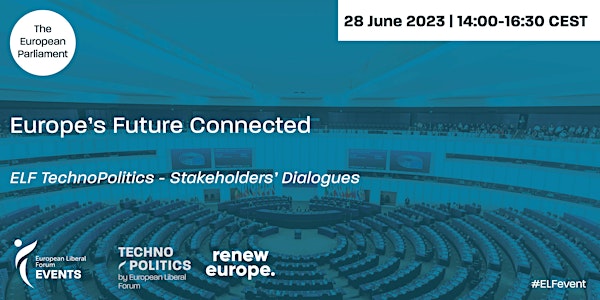
ELF Stakeholders’ Dialogues - Europe’s Future Connected
The ELF’s “Stakeholders’ Dialogues” serves as a platform for open and informed exchange of views between a diverse network.
Date and time
Location
European Parliament - Meeting Room Spinelli 5G375
60 Rue Wiertz 1050 Bruxelles BelgiumAbout this event
In focus: Europe’s Future Connected - Hosted by MEP Alina Mituta
The upcoming European Liberal Forum’s Stakeholders’ Dialogue will discuss the future of the connectivity sector, aiming to gather insights on its changing tech and market dynamics. The event aims to foster an exchange between innovators, disruptors, and policymakers in the connectivity market for outstanding progress. The discussion is divided into two panels: the first panel will focus on the industry's shift from traditional operator models to virtualised ones, discussing the impact of new technologies like space infrastructure and 6G on the sector; the second panel will address policy, including strategic digital autonomy and EU industrial sovereignty, along with broader geopolitical and economic influences. It will also consider Europe's necessary infrastructure and investments for leading digital transformation.
We invite all participants to reflect upon and respond to a series of crucial questions detailed in the recent European Commission consultation to stimulate comprehensive and insightful discussion.
Technological and market developments.
Challenge: How are the evolving technological and market developments impacting the future networks and business models for electronic communications?
The future of electronic communications demands massive investment in new technologies, with critical impacts on the network infrastructure and business models. The transition towards software disaggregation, network virtualisation, and cloudification is expected to reshape the sector, shifting costs, and fostering new market actors. As digital interconnectedness and cyber threats increase, there is a need for enhanced resilience and cybersecurity. Amidst these technological and market developments, providers of electronic communication networks must adapt, potentially assuming new roles within the evolving digital ecosystem.
Fairness for consumers.
Challenge: In an era of rapid digital transformation, how can we ensure consumer fairness, maintaining transparency and protecting consumer rights while driving innovation and competition?
Current regulations ensure minimum electronic communication services are universally accessible at affordable prices, focusing on low-income consumers or those with specific needs. While there's high broadband internet access coverage in the EU, rural areas, older people, and people with disabilities still face challenges. Although prices have generally decreased, rising inflation, energy costs, and certain market developments may pressure consumer costs upward in the short term.
Barriers to the Single Market.
Challenge: What are the current barriers to the Single Market in the digital sector, and how can these be effectively dismantled to encourage seamless digital integration and interoperability?
The regulatory intervention has reduced barriers in electronic communications networks, shifting from 18 regulated markets in the early 2000s to just two fixed wholesale markets in 2020. However, EU electronic communications markets remain primarily national, hindering economies of scale. Although roaming policy and radio spectrum policy aid in lowering barriers, a more integrated market would enhance EU competitiveness. An updated spectrum governance framework may also be needed to strengthen EU strategic autonomy and minimise dependencies.
Fair contribution by all digital players.
Challenge: How can we establish a framework that ensures a fair contribution by all digital players, large or small, to sustain the necessary investments in the digital sector?
As data exchanged grows, some electronic communications operators call for content and application providers (CAPs) to contribute to network deployment costs, arguing for a "fair" distribution of costs. However, CAPs counter that such payments would be unjustified and could breach net neutrality rules. Other stakeholders urge cautious regulation, suggesting accurate data traffic management could positively impact the environmental footprint. This debate intersects with the European Declaration on Digital Rights and Principles, emphasising social responsibility and a neutral, open internet.
This event is meant to be more than just a discussion - it's a unique platform for collaboration, shared learning, and an opportunity to jointly shape policies of the digital sector, thereby paving the way for a digitally forward Europe.
Organised by
Events are organised by the European Liberal Forum. Events receive financial support from the European Parliament. The sole liability remains with the organiser. The European Parliament is not responsible for any use that may be made of the information contained therein.